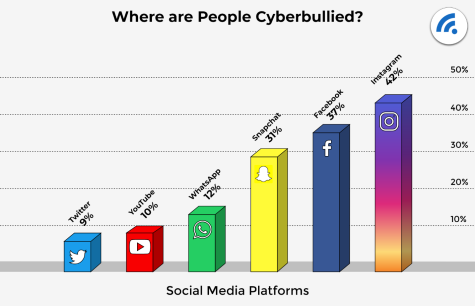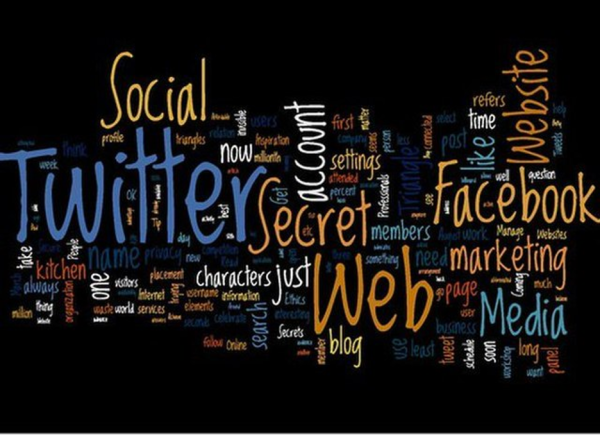Huntingtown’s Cyberbullying Calamity
April 26, 2022
Oftentimes, there is unfathomable irony in the art of cyberbullying. For one, if the perpetrators are even the least bit clever, which is debatable in this instance, the outside world is oblivious to who these offenders are. This allows anonymous bullies to accuse victims of grievances that they are quite capable of facilitating themselves, hence the term, “irony.” If this concept is still too complicated for you to understand, and I have little faith in whom this article is truly intended for, take comfort in the prospect that Google is, in fact, free.
Currently, in an instance far more personal to Huntingtown, this conundrum of cyberbullying has taken the form of an entire Instagram page dedicated to targeting and humiliating Huntingtown students due to their physical appearance by grouping all victims beneath the insult “fatherless.” Though the page itself will remain nameless, its nature is not unique; there have been plenty of student-run Huntingtown pages popping up on Instagram all school year. These include more popular Instagram pages that humorously feature photos of students that have fallen asleep in class or have parked poorly in the student parking lot. The content on these pages is good-humored, light-hearted, and not the least bit incriminating, as it profits from universal shortcomings like an occasional bad parking job and nodding off in class. But to create an entire Instagram page with the intent of isolating and humiliating students by publicly donning them “fatherless” is unbelievably barbaric.
The insult “fatherless” alludes to far more than the literal lack of a father figure in one’s life. In recent months, “fatherless” has been frequently used to suggest a variety of insults, some of which suggest the root of one’s unintelligence or the cause of “non-normal”/immoral behavior. Urban Dictionary, the cesspool for all modern-day slang, defines it as, “A word, usually an insult, used to describe someone who figuratively/literally has no father figure. For example… someone way to obsessed with a particular singer/kpop group.” Another definition merely enlightens us that someone deemed “fatherless” is “a cringe kid.” The implications of the word are essentially infinite, as long as it is applied in a generally negative context. To insinuate this about multiple Huntingtown students on a public platform is not only a baseless accusation but utterly vile.

On a surface-level inspection of the account, the “fatherless” title seems to be used in reference to any Huntingtown student who has colored hair, as every student that has been (non-consensually) featured on the page possesses dyed hair of varying hues. At the very least, these perpetrators have had the grace to shield their victims’ faces with classy emojis, like that of a clown or Easter Island head, so their identities remain protected. (A terribly thoughtful gesture, to say the least.)
Nevertheless, the chosen profile picture only adds insult to injury, as it features a sort of grotesque caricature of the people these bullies pride themselves in targeting, mocking “unconventional” hairstyles, glasses frames, and makeup/stylistic choices. The entire nature of the page, from the username to the content to the profile picture, is revolting.
“It makes me sad,” says Mrs. Cox, who was contacted about the page mid-December when a student brought it to her attention. She has since emailed the assistant superintendent, Dr. Johnson, and Mr. Weber, who has since reported it to the police to be monitored. “No one in those pictures is doing anything to anyone,” she continues. “If you don’t like someone’s lifestyle, what does it matter to you? It doesn’t affect you at all. I can’t wrap my head around why someone would go out of their way to do something like this.” Mrs. Watson, a safety advocate at Huntingtown, shares a similar sentiment: “Students are already so involved in school and their own lives. They shouldn’t have to come to school and wonder if they’re going to be bullied today.”
Perhaps what makes this page all the more frustrating is that it is tactfully framed in a way that might not technically be considered “cyberbullying” by its textbook definition. Apart from alluding that featured students are “fatherless,” there is no other indicator in the captions or comments that directly insult the students on the page, although I’m sure everyone knows better. There is an occasional emoji that will negatively insinuate something about the page’s victims, but for the most part, this page is frustratingly and subtly “innocent.” However, I believe that anyone with a pair of eyes and basic critical thinking skills can decipher the deeper implications almost immediately. Followers will silently support the page, like a photo that openly mocks a fellow student, and move on, making the previously known lines of cyberbullying a bit more blurred.
In a similar vein, the bio reads with sardonic hilarity: “Not associated with HHS. Submissions welcome.” It’s ironic, considering how the username handle quite literally includes the acronym for Huntingtown High School, and we all know exactly what this page is associated with. It is a method to save face and yet another tactic to continue their astute ways of bullying. “It tries to shamelessly protect itself and encourages others to join in,” remarks Senior Jennifer Izaguirre Martinez. Furthermore, reducing human beings to nothing more than “submissions” because of their hair color is incomprehensibly dehumanizing. “We have to remember that these are real people who go to Huntingtown,” says Mrs. Cox.
The short of it is that this page, by definition, is a cyberbullying offense. It checks off a majority of the boxes in the following definition: “Sending, posting, or sharing negative, harmful, false, or mean content about someone else. It can include sharing personal or private information about someone else causing embarrassment or humiliation.” It is making a mockery of students who simply exist, which is something that no Huntingtown student should either stand for or stand by.

“If someone happens to post something like this, it should be brought to someone’s attention immediately,” advises Mr. Greever, one of Huntingtown’s safety advocates. “If it’s brought to someone’s attention three, four months later, it’s harder to develop information.” In instances where victimized students aren’t even aware they’re being anonymously bullied, which is quite possible in this scenario, Mr. Greever continues to encourage the student body to get involved. “It’s your responsibility as young adults to report pages like this. Sometimes these pages can snowball out of control, but you have the power to stop it.”
Both safety advocates at Huntingtown are confident in dealing with different cyberbullying efforts using a variety of methods. “We have cameras everywhere,” warns Mrs. Watson. “We could go back on the cameras and try to figure out who was standing near them, who might’ve taken the picture, and call those students down. Sometimes law enforcement would have to get involved depending on the severity of it.” Currently, there is an investigation underway regarding this specific account, and Mr. Greever merely reveals that “It is being taken care of.” However, anonymity regarding the case on their end is required.
Every day, another child joins the ranks of social media, completely unaware of what they are soon to endure. “In teenagers,” a 2012 study says, “depression is considered a major – if not the leading – cause of teen suicide.” Correspondingly, national depression rates among modern-day youth are also on the rise, and countless more studies contribute this newfound increase to social media. Cyberbullying cases like these assuredly contribute to this growth in depression, anxiety, and in some cases, suicide. So, one can only hope, at least for the perpetrators’ sake, that they merely don’t comprehend the potential extent of their abuse. If they do, their actions represent cruelty beyond belief.

“We need to teach our students and our children that diversity matters, and it should be respected,” Mrs. Cox advises the student body. “You don’t have to agree with every choice people make, but you also don’t have to go out of your way to put out that negativity and make everyone’s life miserable. It’s hard enough to come to school every day, so why are you making it even more difficult for people to come?”
Pages like these are divisive, hurtful, unnecessary, and merely reflect the immaturity of the offenders. I’m no final judge in the grand scheme of things, but if there were ever any “fatherless” individuals in this entire scenario, they would most certainly not be the blameless students with pink hair.










